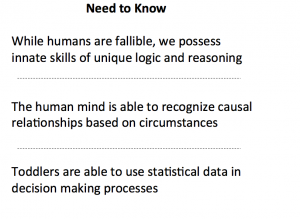Are we as dumb as we think we are?
November 10, 2015 ~ Written by: W.B. “Bud” Kirchner
 “There is something fascinating about science. One gets such wholesale returns of conjecture out of such a trifling investment in fact.” – Mark Twain (1883)
“There is something fascinating about science. One gets such wholesale returns of conjecture out of such a trifling investment in fact.” – Mark Twain (1883)
I have chosen to repeat a quote cited by the ‘star’ of this for reasons I trust will become apparent.
Let me start by declaring I have a new heroine – Laura Schulz. To me, this associate professor in the Department of Brain and Cognitive Sciences at MIT, is the Lara Croft of brain research – a published author and big game hunter (in this case the brain, with 100 billion neurons, is the big game) who does not disappoint.
 She (and her colleagues) has reached this lofty accomplishment for (at least) two reasons related to their work with cognition.
She (and her colleagues) has reached this lofty accomplishment for (at least) two reasons related to their work with cognition.
- Schulz provides a perfect counterbalance of information to a theme that has appeared in some of my previous posts – our fallible nature and our biases. Essentially, we get it wrong more than we get it right. But thanks to her, we have additional counterbalancing evidence from the world of toddlers!
- She also provides overwhelming evidence to support my earlier post (“Is Hyper-connectivity Making us more Disconnected”) for the relevance of carbon in this day and age of silicon. Incidentally, I know this is hard to believe but apparently my original post was not universally convincing but I am sure this one will be!
I will deal with why we get it wrong more than we get it right here and why computers will never match the brain in the next post.
Toddlers can’t speak, yet understand statistical data and patterns
In very general terms: Schulz and her colleagues use an experimental design where they had a subset of toys that in some cases worked or not depending on circumstances – including defective toy or ‘defective’ individual manipulating the toy.
What was mind blowing was that toddlers were able to show significant cognitive skills as described:
- “16-month-old infants engage in distinct patterns of behavior depending on the relative probability of the competing hypotheses.” (from a 2010 paper she co-authored with MIT colleague Hyowon Gweon)
- “4–6-year-olds (mean: 63 months) systematically converge on solutions to problems, consistent with an ability to imagine the abstract properties of causal problems and their solutions.” (from a 2015 paper co-authored with Rachel W. Magid and Mark Sheskin)
For the pure business crowd – that means they showed cognitive prowess in two areas:
- Generalization
- Causality
In summary – they showed that children, in only their second year of living, use statistical data in the decision-making process.
“A child in the second year of life can use statistical data to decide how to deal with the world.” ~ Laura Schulz
It is startling (no inspirational!), no matter how you describe it, to see that these children had learned so much from so little – so quickly.
With all that in mind you should hit her Ted Talk: “The Surprisingly Logical Minds of Babies”.
Yin-Yang and the balance of nature and mind
In sharp contrast to earlier posts on cognitive biases, thinking errors and other shortcomings that I have flagged – this one is more a celebration of how special the human mind is:
- Generating rich inferences from sparse data
- Possessing basic instincts for statistical information
- Recognizing causal relationships based on circumstances
In closing, I can only think of a yin-yang scenario. Clearly, on one hand we are fallible and make mistakes we should see coming. On the other hand, we possess innate skills of logic that are absolutely unique.
In other words, we don’t always get it right but we certainly don’t always get it wrong.
“It is my hope the concept of the Business Brain Model will encourage business people to think more on how to play to their strengths and augment their weaknesses.”
Could this be an example of the Chinese philosophy reflecting harmonization and dynamic balance? Let me know your thoughts in the Comments section.
It is my hope the concept of the Business Brain Model will encourage business people to think more on how to play to their strengths and augment their weaknesses.
Sources of information
Given the importance of Schulz work I encourage you to spend a bit of time delving into the hard science.
“Imagination and the generation of new ideas,” Magid, Sheskin, Schulz, “Cognitive Development” 2015
“Toddlers infer unobserved causes for spontaneous events,” Muentener, Schulz, “Frontiers in Psychology,” December 23, 2014
“Is it me or the world? 16-month-olds distinguish competing hypotheses about the cause of failed interventions,” Gweon, Schulz,
In S. Ohlsson & R. Catrambone (eds.), Proceedings of the 32nd Annual Conference of the Cognitive Science Society. Cognitive Science Society 2846–2851 (2010)
“Developing multivariable thinkers,” Kuhn, Ramsey, Arvidsson, “Cognitive Development, Volume 34,” April–June 2015, Pages 99–110
About the Author: W.B. “Bud” Kirchner is a serial entrepreneur and philanthropist with more than 50 years of business success. He is not a scientist or an academic but he does have a diversified exposure to neuroscience, psychology and related cognitive sciences. Generally speaking, the ideas he expresses here are business-angled expansions of other people’s ideas, so when possible, he will link to the original reference.
